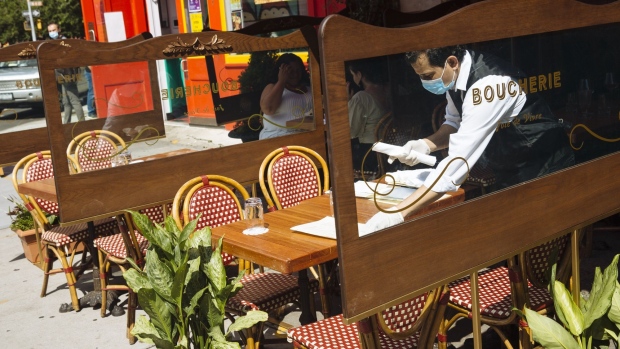UBS Analyst Who Took On Evergrande Now Bullish on China Property
When it comes to Chinese real estate, John Lam is a lone wolf.
Latest Videos
The information you requested is not available at this time, please check back again soon.
When it comes to Chinese real estate, John Lam is a lone wolf.

Analysts upgraded their forecast for China’s growth this year after a better-than-expected performance in the first quarter — but they see more signs that the world’s second-biggest economy will struggle to escape from deflationary pressures.

A rash of failures of A-rated insurers points to a hidden weakness in the market, researchers say.

Whirlpool Corp., the owner of the Maytag and Amana appliance brands, is cutting about 1,000 salaried positions worldwide to reduce costs as slow US home sales limit demand.

Chicago Bears officials alongside Mayor Brandon Johnson unveiled plans for a $4.7 billion project to build a publicly owned, enclosed stadium and enhanced lakefront area.
Jul 2, 2020
, Bloomberg News

(Bloomberg) -- Editor’s Note: No city is more important to America’s economy than New York, and none has been hit harder by the coronavirus. “NYC Reopens” examines life in the capital of capitalism as the city takes its first halting steps toward a new normal.
Workers trickling back into Manhattan office towers are finding that life isn’t the same without a proper meal and someone to share it with.
Banker Ed Grebow spent three months hunkered down in the Hamptons, cooking for himself and pining for his old haunts. When he returned to the office, he couldn’t find a decent bagel, let alone an omelet at the Regency or the hamachi at Michael’s.
Skipping a meal at a restaurant seems like a reasonable sacrifice in a pandemic. Still, the absence of the New York power lunch — along with business breakfasts and charity dinners — will change the texture of the work week, making the office a less social and collaborative place.
“I’ve had meals where I left the restaurant thinking that I had really learned something that would be useful that day or in the future,” said Grebow, managing director at Lakewood Advisors. “That kind of interaction can’t happen over Zoom.”
It could be a while before the work lunch is once again a regular ritual in Manhattan. The reopening of indoor dining in New York City was delayed on Thursday as coronavirus cases surged in other parts of the U.S., and many large financial firms are taking a cautious approach to bringing employees back to offices.
We’re tracking everything you need to know as New York reopens after the Covid-19 shutdown. Read our explainer and sign up for alerts sent directly to your inbox.
Sit-down meals at restaurants have long been crucial for building relationships that grease deals and make the workday more tolerable. Many employers, meanwhile, treat food and coffee as the most important amenities for keeping workers happy.
New Ballet
Now, landlords and tenants are studying a new ballet for shuffling people and food through buildings. That means figuring out how to get the lunch rush through elevator lobbies and limiting travel in and out of buildings. There are also new safety protocols for serving meals prepared on-site.
Hudson Yards developer Related Cos. is offering a delivery service to bring lunch from the high-end restaurants in its luxury shopping mall to its nearby office buildings using on-staff delivery people who are temperature-checked and Covid-tested, according to Ron Parker, chief executive officer of Related Restaurant Group.Employees who have come to enjoy free or subsidized meals will also need to make adjustments. The tech industry is known for its lavish office food options, but the Covid-19 era means those perks have to be scaled back.
Facebook’s Manhattan offices used to offer everything from plant-based cuisine and juice bars to halal food carts and gelato. Now, workers will be provided with grab-and-go meals, according to Jamila Reeves, a spokeswoman for the company.
Grabbing a Sandwich
Bill Rudin, who runs his family’s real estate company, has been buying sandwiches from a nearby coffee shop and eating at his desk, taking a moment to have a socially distanced conversation with his daughter who also works in firm’s Park Avenue office.
He’s banking on human ingenuity to solve the work lunch problem, and looking forward to dining outdoors at his go-to spot, Casa Lever.
“People are going to adapt to the change and it won’t be disruptive to how business is conducted around food,” Rudin said. “You’ve already seen all these restaurants taking over more street space.”
Partnership for New York City CEO Kathy Wylde sees silver linings in the new food culture. Canceled charity galas have made it acceptable to donate online and skip bland meals and milquetoast speeches. Shuttered restaurants and a barren office pantry have also made it easier to eat healthy now that Wylde has returned to her office near Bowling Green.
“It was a good place to starve off some of the pounds I put on during the pause,” she said.
Still, it’s not that hard to find good food in Manhattan, even during a pandemic. The bigger adjustment for power-lunchers, takeout cliques, and pantry-lurkers will be getting used to socially distanced meals.
For some, the daily commute won’t be worth the trouble until there’s a corner table, or at least a catered conference room at the other end.
“It’s not just having lunch or brunch or dinner, it’s having actual meetings with human beings,” said David Schamis, chief investment officer at Atlas Merchant Capital. “If those things aren’t going to happen, it certainly reduces the utility of actually going into the city every day.”
©2020 Bloomberg L.P.